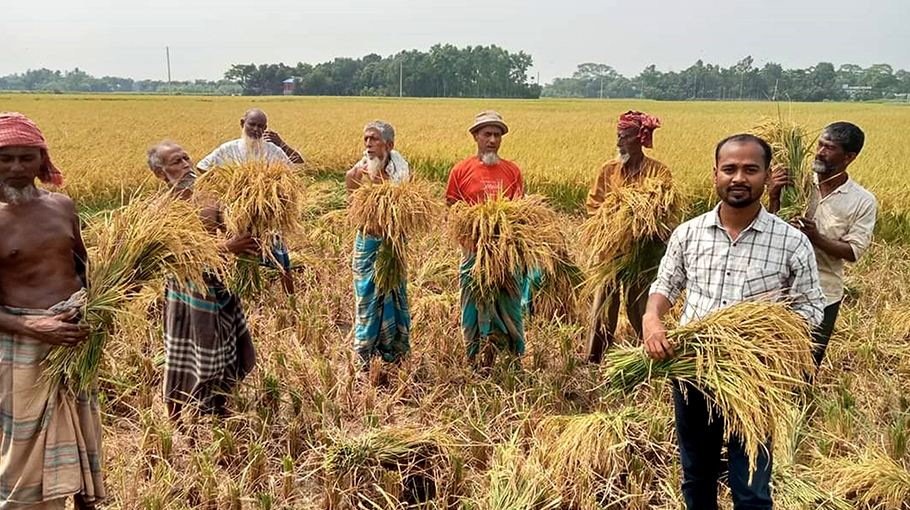New rice varieties bring a ray of hope for Nabinagar farmers

Nestled in the middle of the vast Haor in the district of Brahmanbaria, Nabinagar is one of the biggest upazilas in the area. This year, 18,100 hectares of the upazila are planted with Boro, which is a significant increase of 100 hectares over the previous year.
An innovative project that increased Boro cultivation was the first-ever installation of the BADC Solar Irrigation System on 150 bigha of land in Lahri village, Rachullabad Union. With the support of an incentive programme run by the Directorate of Agriculture Extension, this creative project has established a standard for sustainable farming methods.
Furthermore, in a commendable display of resourcefulness, 70 bigha of fallow land in Bill, under the auspices of the Ashrayan shelter in Laurfatehpur Union, has been repurposed for Boro cultivation. Here, Haor farmers opt for short-duration rice varieties such as Bridhan-28 and Bridhan-29, strategically chosen to preempt the repercussions of premature floods.
Despite their historical preference, recent years have seen a decline in the immunity of these two varieties, primarily attributed to the scourge of fungal neck blast disease. In response, concerted efforts have been made by the Department of Agriculture, culminating in extensive field days, farmer training sessions, yard meetings, and widespread dissemination of informative leaflets. Resultantly, farmers' interest in Bridhan-28 and Bridhan-29 has waned, paving the way for the adoption of alternative varieties. Notably, 60 metric tonnes of high-quality rice, including Bridhan-88, Bridhan-96, Bridhan-89, Bridhan-92, and Bangabandhu Dhan-100, have been produced through collaborative efforts among 12 seed production groups. These varieties have been distributed among 5,000 farmers under the aegis of the Upazila Agriculture Incentive and Purnabasan programmes. Additionally, novel cultivars such as tall chicons and basmati-type Binadhan-25 have made their debut, courtesy of the Partner and Freep project. Meanwhile, the introduction of Bridhan-101, Bridhan-102, Bridhan-104, Bridhan-105, and Bridhan hybrid rice-08 across 225 bigha in 75 locations in Nabinagar district signifies a paradigm shift in agricultural practices.
Enthusiastic farmers eagerly await the fruition of their labour, with sentiments ranging from optimism to exhilaration. Binadhan-25, revered for its slender grains and abundant panicles, elicits hopeful anticipation from farmers like Ibrahimpur Union's Binadhan-25. Similarly, the allure of Bridhan-105, touted as diabetic-friendly rice, captivates the imagination of agriculturists like Abu Naeem from Jafarpur village.
The palpable excitement extends to farmers like Pradeep Pal of Bholachong village, who finds himself enchanted by the aromatic allure of Bridhan-104. Meanwhile, Judge Mia of Chuoria village places his bets on Bridhan-102, foreseeing a bountiful harvest devoid of maladies.
Reflecting on these developments, Upazila Agriculture Officer Krishibid Md. Jahangir Alam Liton asserts, "The advent of high-yielding, disease-resistant crops augurs well for agricultural sustainability. We remain steadfast in our commitment to empower farmers through material support, incentives, and educational exhibitions, fostering the adoption of innovative cultivation practices."




